Student ‘bots’ detected at City College
Fake students are enrolling in online classes at City, potentially taking spots from real students
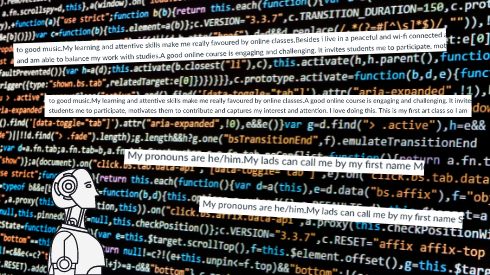
Signs of bot behavior can include identical phrasing and nonsensical language, or inappropriate answers to prompts. Other indications include multiple students with the same or similar email addresses or bank account numbers, or withdrawing from school after receiving aid, according to the U.S. Department of Education Office of the Inspector General. Canva graphic by Kathy Archibald/City Times Media
February 11, 2022
A City Times Media reporter noticed an odd pattern in her online class.
The first assignment on the web-based learning program Canvas was to introduce yourself and answer a single question. Although other students’ answers weren’t visible until a student posted their own, numerous answers used the same odd quirks of wording and punctuation, even the exact same phrasing.
Some were nonsensical. “This is my first art class,” when the class was not art. Many didn’t address the only question asked.
Fake students popped up throughout California community colleges this past year, and San Diego City College is no exception.
“I have about 15 students in my online course that have not shown up to any Zoom classes, replied to any emails, or even logged on to Canvas for that matter,” said Anna Delgado, an assistant professor of fine art at City.
Delgado is concerned they might not be genuine students at all. With a full class load this semester, she said she is daunted by the idea of trying to make contact with each one individually.
During the summer and fall of 2021 CalMatters, Los Angeles Times and other outlets reported on community colleges in California overrun by students who were not participating in virtual classes, or were otherwise acting strangely – likely in attempts to cash in on financial aid money before dropping out of class.
And the repercussions of financial aid fraud are felt beyond the loss to taxpayers. “Bots” may take class spots which are then denied to other students once classes and waitlists are filled.
The phenomenon also paints an incorrect picture of student interest, retention, class size and the need to recruit students. They skew admission and demographic numbers, and raise student privacy concerns.
Katie Rodda, a professor of dramatic arts and co-chair of the visual and performing arts department at City was excited when she saw her summer 2021 online drama class was full. Then the Friday before the semester began, the class dropped from 45 to 21 enrollments.
When Rodda looked more closely, every dropped student except one had the same email address.
According to a U.S. Department of Education Office of the Inspector General fraud awareness pamphlet, this is one of the tell tale signs.
Rodda’s spring semester classes are all in person, but she said a colleague who will start teaching an online class in late February noticed enrollment suddenly jumped from 13 people to 45 overnight. When the professor checked, those new students’ email addresses appeared suspicious, Rodda said.
“What’s so disappointing is that some students don’t know or choose not to exercise the waitlist option,” Rodda said. “They see a class is full, they move on.”
Rodda said the problem is even more prominent with late start classes.
“They enroll for the spring semester, they get their HEERF money and then they can walk away, withdraw from the class before they even have to log on,” she said.
Geoffrey Wood, a special agent with the ED OIG, explained in a 2020 training video that while financial aid fraud has been around for a long time, a number of factors related to the pandemic have increased the risk, including CARES Act funding, the spike in online classes, and incentives to bring students back to school.
Wood said fraud schemes usually involve a ringleader or ringleaders who use stolen identities or recruit others to enroll in school to get financial aid. He added that fraudsters often target low-cost schools to maximize payoffs in the form of refunds.
The special agent shared an example of a father and son team in Arizona who used 289 “straw students” to allow disbursement of $1.4 million in financial aid. Both were convicted of fraud, sentenced to jail time and required to pay restitution.
At City’s fall 2021 convocation, City President Ricky Shabazz discussed the benefits and challenges of the increase in federal funding.
“We’ve got about $12 million that have to be spent by June (of 2022),” Shabazz said. “To put it in perspective, normally our discretionary budget is a $1 million.”
In efforts to disburse that federal funding, City offered $500 in financial aid to students who showed up for last semester’s Fall Fest event, and will do the same for 20 students at the upcoming Black Student Forum.

But the financial aid possibilities throughout the California Community Colleges system are even more tempting to fraudsters, and CCC administrators responded to the threat over the summer.
To apply to any of the 116 CCC system colleges, including City, potential students create an account through OpenCCC, providing a gateway to the entire system.
In an effort to address admission application fraud, the CCC Office of the Chancellor implemented a program called Imperva Advanced Bot Detection on OpenCCC on July 15, 2021, according to an August 2021 memorandum obtained by online news organization CalMatters from then-Interim Vice Chancellor of Digital Innovation and Infrastructure Valerie Lundy-Wagner to CCC officials.
“The (CCC Technology Center) has identified that approximately 20% of the OpenCCC traffic is malicious and bot-related, of which nearly 15% has been addressed through Imperva,” Lundy-Wagner wrote in the memo.
At the same time, the CCC Chancellor’s Office implemented a policy change requiring colleges to confirm that an application is from a real student within two weeks or the application will be automatically confirmed as fraud, according to the memo.
Possibly as a result of this change, San Diego Community College District officials saw a decrease in fake students during the fall 2021 semester, according to an email from SDCCD Dean of Student Services Victor DeVore to City officials on Feb. 9.
But “it’s popping back up this spring,” DeVore wrote.
DeVore advised that faculty drop students who are not participating in classes, “per regular census procedures,” and to follow up with details to officials when fraud is suspected.
A June 2021 CCC memorandum from Lundy-Vagner, also obtained by Calmatters, instructed staff that it was vital to drop non-attending students prior to the census date to reduce the likelihood of fraud.

Jack Beresford, director of communications and public relations responded to City Times Media’s request for an interview with a statement on Feb. 10 that read, in part, “with the influx of federal emergency aid and the shift to remote learning due to the COVID-19 pandemic, San Diego City, Mesa, and Miramar Colleges have seen an increase in “bad actors” trying to enroll in classes for financial gain. In response, the district has convened an anti-fraud task force to identify and implement systems to mitigate fraud.”
Back in the virtual classroom, faculty continue balancing the potential for fraudsters in their midst with the demands of the classroom and each student’s privacy and circumstances.
“Somebody somewhere is making money off this and taking federal funding away from other deserving students,” Rodda said. “Please, we just implore the real students to get on a waitlist or to reach out to the professor and say I really want to take your class.”
Have you noticed suspicious behavior in your classes? City Times wants to hear your voice. We are looking for our community – fellow students, faculty, staff and alumni – to let us know if you have uncovered a bot. You can send your thoughts in writing by email at [email protected] or share them on social media, including @sdcitytimes and #cityspeaks. You can also leave us a voice recording.




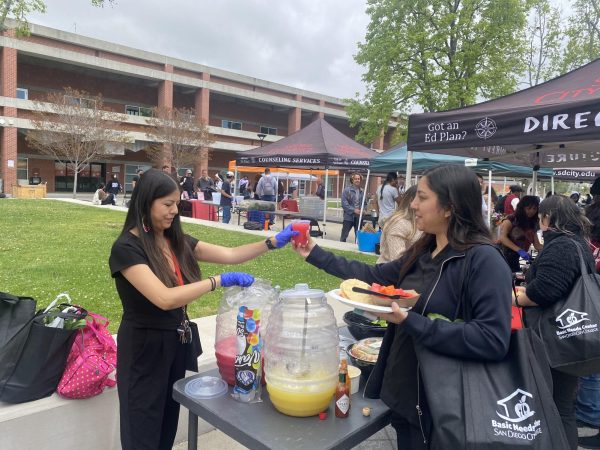
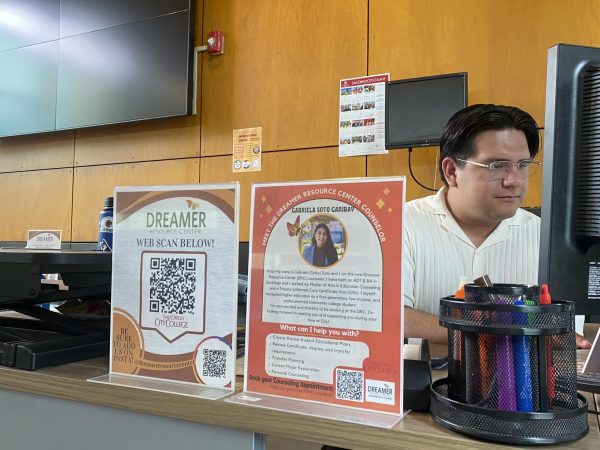


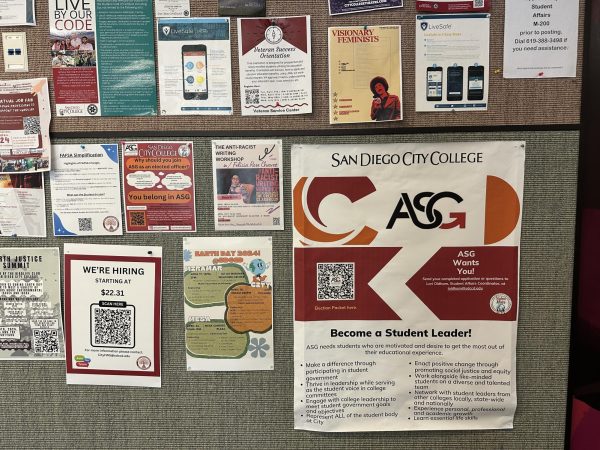
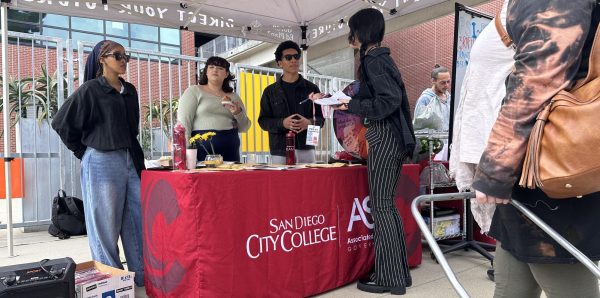


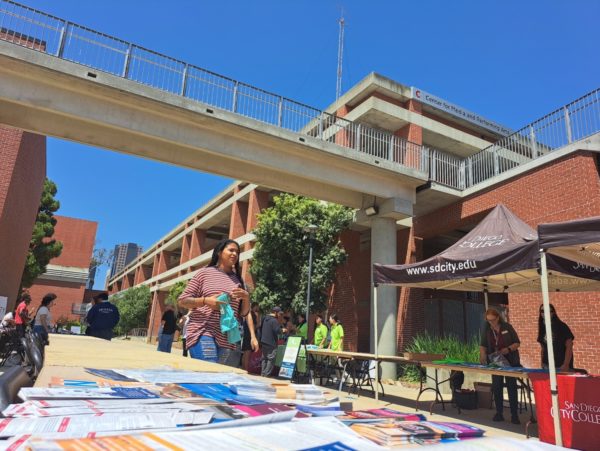

Julie Brossy • Feb 12, 2022 at 12:40 pm
Excellent story! Thank you, Kathy!